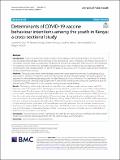Determinants of COVID-19 Vaccine Behaviour Intentions among the Youth in Kenya: A Cross-sectional Study
View/
Publication Date
2022-06-23Type
Article, Journalviews
downloads
Metadata
Show full item recordCitation
Osur, J.O., Chengo, R., Muinga, E. et al. Determinants of COVID-19 vaccine behaviour intentions among the youth in Kenya: a cross-sectional study. Arch Public Health 80, 159 (2022). https://doi.org/10.1186/s13690-022-00904-4
Abstract/
Introduction: COVID-19 has become a public health concern globally with increased numbers of cases of the dis ease and deaths reported daily. The key strategy for the prevention of COVID-19 disease is to enhance mass COVID-19 vaccination. However, mass vaccination faces challenges of hesitation to acceptance of the vaccine in the community. The youth may not be among the vulnerable population to severe COVID-19 disease but are highly susceptible to contracting the virus and spreading it. The aim of the study was to assess COVID-19 vaccine youth behavior intentions and their determinants in Kenya. Methods: The study used a mixed method design, employing a cross-sectional survey and focused group discus sions across 47 counties in Urban, Peri-Urban and Rural settings of Kenya. The interviewees were youths aged 18–35, registered in online platforms/peer groups that included Shujaaz, Brck Moja, Aifuence, Y Act and Heroes for Change. Quantitative data was collected using Google forms. A total of 665 interviews were conducted. Quantitative data was analysed using STATA version 16. In this paper we report quantitative study fndings. Results: The fndings of the study indicated that only 42% of the youth were ready to be vaccinated, with 52% adopting a wait and see approach to what happens to those who had received the vaccine and 6% totally unwilling to be vaccinated. The determinants of these behavior intentions included: the perceived adverse efects of the vac cine on health, inadequate information about the COVID-19 vaccine, conficting information about COVID-19 vaccine from the social media, religious implications of the vaccine, impact of education level on understanding of the vac cine, perceived risk of contracting the COVID-19 disease, efcacy of the COVID-19 vaccine, COVID-19 afecting women than men and trust in the ministry of health to lead COVID-19 interventions. Signifcantly it was found that hesitancy is higher among females, protestants and those with post-secondary education. Lack of information and concerns around vaccine safety and efectiveness were main cause of COVID-19 vaccine hesitancy. Social media was the major source of information contributing to hesitancy. Other contributors to hesitancy included low trust in the MoH and belief that mass vaccination is not helpful. Conclusion: Vaccine hesitancy remains high among the youth but the causes of it are modifable and health systems need to have evidence based engagements with the youth to reduce vaccine hesitancy
Further Details
© The Author(s) 2022. Open Access This article is licensed under a Creative Commons Attribution 4.0 International License, which permits use, sharing, adaptation, distribution and reproduction in any medium or format, as long as you give appropriate credit to the original author(s) and the source, provide a link to the Creative Commons licence, and indicate if changes were made. The images or other third party material in this article are included in the article’s Creative Commons licence, unless indicated otherwise in a credit line to the material. If material is not included in the article’s Creative Commons licence and your intended use is not permitted by statutory regulation or exceeds the permitted use, you will need to obtain permission directly from the copyright holder. To view a copy of this licence, visit http://creativecommons.org/licenses/by/4.0/. The Creative Commons Public Domain Dedication waiver (http://creativeco mmons.org/publicdomain/zero/1.0/) applies to the data made available in this article, unless otherwise stated in a credit line to the data.
Publisher
BMCCollections
- General - GEN [367]

